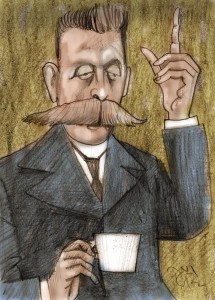10 July 1922
To the editor of Kuntres:
My fellow music lovers in the Yishuv, tilling the land and laboring on the roads as they whistle and hum the works of the great composers, will no doubt be interested to hear of my encounter with the man who is perhaps the most notable of our nation’s musical representatives in the great cultural metropolis of Paris. However, they may be disturbed to hear that said representative is a broken man from a dying world.
The story begins with my arrival in Paris just last week, after the successful conclusion of my agronomy studies in Toulouse. 
illustration by Avi Katz
Eager to sample what the great city had to offer, I immediately examined the billboards and proceeded to the Théâtre des Champs-Élysées (yes, the same place where, just nine years ago, the premiere of Stravinsky’s Le sacre du printemps caused a riot!) to hear a program of piano concerti. One of the pieces was Tchaikovsky’s piano concerto no. 2 in G major, and the other a work in E major by a composer I was not acquainted with, one Moritz Moszkowski.
I will reluctantly pass over a description of a wonderful performance of the Russian composer’s great work, which I am sure is familiar to all your readers. Some will complain that it is overly long, but I maintain that its every moment contributes to a whole that is a sublime expression of the Russian national spirit.
I could not have been more astounded to find that the conductor chose to follow up Tchaikovsky’s great work with a piece so devoid of weight that it simply wafted through the air of the concert hall like chaff thrown to the winds.





